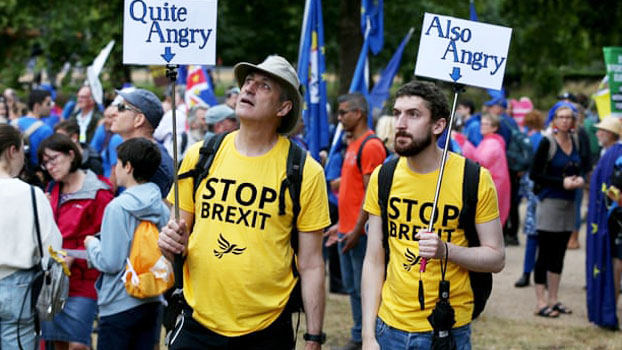The warnings about a no-deal Brexit aren’t being heard

According to a poll last week, 79% of respondents said the British public don’t know what will happen in the event of a no-deal Brexit. That is an abject failure of all those groups campaigning against no deal. Many of the same personalities involved also failed to win the referendum campaign itself and have now reassembled around a second referendum campaign, which has hitherto failed to take off. Yet still they persist.
“What’s going on here?” they say. “Why don’t people know what no deal means?” they complain. “Aren’t they watching Newsnight? Are they stupid?”
No. People aren’t stupid. As they say in poker circles, if you’re looking around the table and wondering who’s the mug, it’s you. People get on with their lives without the Today programme. They’re not reading that 124-page report on no deal. They’re not watching when you take to the stage to deliver a speech to a packed room at a thinktank in Whitehall. Nobody’s watching except those you don’t need to persuade and who won’t be affected by the catastrophe your report outlines. So don’t be surprised when the majority of the electorate either don’t know what no deal means or, worse, think it’s going to be OK. It’s not their fault that your campaign has spent the best part of two years speaking over their heads.
This is a problem that runs through progressive political parties and campaigns across
the western world; the need to demonstrate how clever they are to
each other rather than focusing ruthlessly on message and
persuasion. It used to be that ideas
delivered from on high by leading
politicians were influential
This is a problem that runs through progressive political parties and campaigns across the western world; the need to demonstrate how clever they are to each other rather than focusing ruthlessly on message and persuasion. It used to be that ideas delivered from on high by leading politicians were influential. To some extent that might still hold, but the rules of the game have hugely changed, and progressives are scrambling to catch up. Delivering vertical messages from an elite source direct to individuals is no longer effective. The trick now is for easily consumable messages to be transported on a campaign’s behalf horizontally between people in their social networks, which requires an altogether different skill set.
Social media has brought with it the ability to mainline a message into the cerebral cortex of whichever target audience we like, at speed and in ways which some find frightening. However, the central problem remains. Whatever message you’re choosing to deliver, it has to conform to certain rules for it to work and be carried from peer to peer.
If we’re going to effectively communicate the dangers of no deal, we are going to need to employ techniques that identify the target audiences we need to reach. More importantly, the message we carry needs to be less about clever debating points and more about identifying the emotional triggers that inspire people to carry the message for us. Words of two syllables at most. Messages of 10 words or fewer. Less top-down elite framing and more peer-to-peer exposure to simple, clear messages. A lesson some parties in the recent European elections took to heart, using some of the new techniques I’ve helped to develop.
Before the 2017 general election, I took myself away from my day-to-day work analysing elections. I felt at the time that I was totally missing the point with my work. I was throwing numbers around when what I wanted was to know much more about why people were voting the way they were. I’ve long been convinced that we know next to nothing about why people vote the way they do. More specifically, I was asking myself: “What actually moves people to vote for Labour or any party?” Leading political scientists appear to think they know the answer to that question. My view is that they don’t.
I found that it is possible to identify the base emotional triggers that invoke and dictate our subsequent behaviours, including whether we vote and whom we vote for. Such emotions are often hardwired unconscious traits over which we have limited control. The next stage was to deploy techniques that sought to convert whatever progressive messages I could find into consumable chunks aimed specifically at exploiting those unconscious traits. We’ve all seen the effectiveness of clean, crisp and emotional language from the right. “Take back control”, “Make America great again”, “Drain the swamp” are just three examples. On the progressive side in the recent European elections “Bollocks to Brexit” from the Liberal Democrats was a promising retort, ironically called out as crude populism by some progressives. Actually, it was ruthlessly effective.
The point is we on the left can do a much better job of condensing the good but lengthy messages we have into messages that actually move people. When it comes to the threat of no deal we should spend less time in dusty Whitehall thinktanks explaining the mechanics of customs arrangements to each other and more time finding ways to cut through with the audiences we need to reach.
Otherwise we risk vacating that ground to the populist right, and we all know how that ends.
Ian Warren is director of the consultancy Election Data



